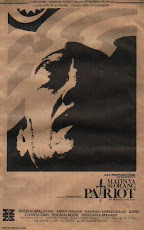#134. Academy's snubbing of The Dark Knight is a crime
20th February, 2009
The Star
CHRISTOPHER KELLY
It conjured up a complex and detailed alternate universe. It featured one of the most convincing portraits of wanton evil ever seen in an American film. Its vision of an upside-down political system rotting from the core struck a deep chord with moviegoers during a heated election year. It grossed more than US$500 million domestically, making it the second most successful film of all time.
Yet despite these considerable achievements, The Dark Knight failed to secure a nomination for an Academy Award for Best Picture. Five far less interesting efforts were somehow deemed more legitimate choices: the charming but slight Slumdog Millionaire; the stodgy biopic Milk; the TV-movie-of-the-week-ish Frost/Nixon; the kitschy Nazi melodrama The Reader; and the dull and soulless The Curious Case of Benjamin Button.
It strikes me as one of the most egregious oversights in academy history, right up there with the similarly clueless shutouts of Do the Right Thing (1989) and Vertigo (1958). And regardless of which movie wins the Best Picture prize Sunday night (and it's almost certainly going to be Slumdog Millionaire), it's clear that the time has come for Hollywood to rethink the entire notion of an "Oscar movie."
This is not, I hasten to add, a sour grapes screed, because my personal favourite was not invited to compete for the top prize. There are a number of other movies I admired in 2008 just as much as The Dark Knight - including Jonathan Demme's Rachel Getting Married, Mike Leigh's Happy-Go-Lucky and Kelly Reichardt's Wendy and Lucy - but I hardly regard their absence from the Best Picture category as a crime.
Quite the opposite, I've long felt that the Best Picture prize should not necessarily strive to reward "the best" movie, which is an impossible-to-quantify notion to begin with, so much as the film that managed to have the greatest artistic and cultural impact. As much as I adore the micro-budgeted Wendy and Lucy, an agonising portrait of an impoverished young woman (Michelle Williams) whose life begins to unravel after her dog goes missing, I can't pretend it sent shock waves through American multiplexes.
But The Dark Knight mattered, the way Best Picture-nominated movies from this decade like Traffic, Brokeback Mountain, Moulin Rouge and There Will Be Blood all mattered. Even if you didn't love the movie (and, frankly, I thought There Will Be Blood was a snooze), you couldn't dismiss the ambition on display or deny that this was a work that sought to expand the boundaries of the art form. A Best Picture nominee, even if it's not a perfect effort, should be something that gets moviegoers talking.
I don't hear anyone talking about Frost/Nixon, The Reader or Milk - unless it's the people who've told me that they'll probably catch all three on DVD. (Combined, these three films have thus far grossed US$63 million - or about what Paul Blart: Mall Cop made in its first ten days of release.) The cultural guardians might point to this as proof of the ongoing dumbing-down of society. But I'd argue that it's proof that American moviegoers aren't nearly as stupid as Hollywood thinks.
The Best Picture nominees this year - and the voters who propped them up - confuse good intentions for good filmmaking (Milk), serious subject matter for serious art (The Reader) and historical significance for dramatic worthiness (Frost/Nixon). I get paid to talk about them, and I have nothing to say - other than that they're boring.
(The Best Picture nominations for Slumdog Millionaire and The Curious Case of Benjamin Button are more justifiable. The former occupies the crowd-pleasing Juno/Little Miss Sunshine slot, while Button offers a genuinely distinct, if decidedly pointless, vision.)
So why was no love shown to The Dark Knight in any of the top categories? (It did earn eight nominations, including one for the late Heath Ledger, who seems guaranteed to win the Best Supporting Actor prize). Part of it probably has to do with the academy's long-standing tradition of awarding lumbering behemoths like Gandhi over enchanting mainstream entertainments like E.T., or blanched, "socially conscious" dramas like In the Heat of the Night over groundbreaking work like Bonnie and Clyde.
But at least E.T. and Bonnie and Clyde made it to the final five in their respective years. That The Dark Knight was passed over suggests to me that Hollywood still doesn't want to accept that it's no longer capable of making the grandiose epics of yesteryear. For Oscar voters to embrace The Dark Knight would be to admit a kind of defeat - that fantasy and CGI have officially triumphed over more human efforts.
(You could argue that the Oscar success of The Lord of the Rings proves my theory wrong. But, remember, those movies had a stodgy literary source, not to mention a cast of mostly British and Australian actors - classic catnip to academy members.)
That's why The Dark Knight's exclusion runs deeper than a mere snub. It also says that the film industry no longer fully understands what it does best. (In some respects, this is the story of our times: Just consider the woes of the publishing and automotive industries.) I'll of course be watching the Oscars, and I'll probably even be glad to see Slumdog Millionaire take the prize - it's the one movie in the nominated bunch with true heart.
But at a point in history where we need all the forward-thinking we can get, the academy seems further than ever behind the curve.
- Copyright (C) 2009 MCT Information Services







0 ulasan:
Catat Ulasan